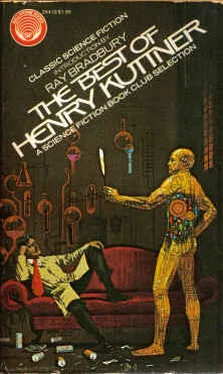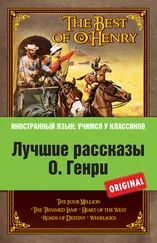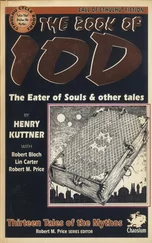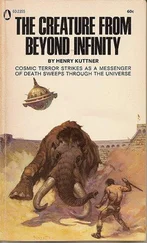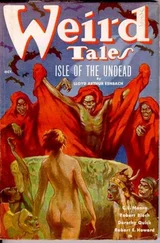“A series of jagged points. Like the oscillating line on a seismograph. When I first saw the Pacific, I was about three. I remember it pretty clearly. It looked-tilted. A flat plain, slanted at an angle. The waves were regular triangles, apex upward. Now, I didn’t see them stylized that way, but later, remembering, I had to find some familiar standard of comparison. Which is the only way of getting any conception of an entirely new thing. The average child tries to draw these regular triangles, but his coordination’s poor. He gets a seismograph pattern.”
“All of which means what?”
“A child sees the ocean. He stylizes it. He draws a certain definite pattern, symbolic, to him, of the sea. Emma’s scrawls may be symbols, too. I don’t mean that the world looks different to her — brighter, perhaps, and sharper, more vivid and with a slackening of perception above her eye level. What I do mean is that her thought processes are different, that she translates what she sees into abnormal symbols.”
“You still believe—”
“Yes, I do. Her mind has been conditioned unusually. It may be that she breaks down what she sees into simple, obvious patterns — and realizes a significance to those patterns that we can’t understand. Like the abacus. She saw a pattern in that, though to us it was completely random.”
Paradine abruptly decided to taper off these luncheon engagements with Holloway. The man was an alarmist. His theories were growing more fantastic than ever, and he dragged in anything, applicable or not, that would support them.
Rather sardonically he said, ‘Do you mean Emma’s communicating with Scott in an unknown language?”
“In symbols for which she hasn’t any words. I’m sure Scott understands a great deal of those — scrawls. To him, an isosceles triangle may represent any factor, though probably a concrete noun.
Would a man who knew nothing of chemistry understand what H2O meant? Would he realize that the symbol could evoke a picture of the ocean?”
Paradine didn’t answer. Instead, he mentioned to Holloway Scott’s Curious remark that the landscape, from the hill, had looked all wrong.
A moment later, he was inclined to regret his impulse, for the psychologist was off again.
“Scott’s thought patterns are building up to a sum that doesn’t equal this world. Perhaps he’s subconsciously expecting to see the world where those toys came from.”
Paradine stopped listening. Enough was enough. The kids were getting along all right, and the only remaining disturbing factor was Holloway himself. That night, however, Scott evinced an interest, later significant, in eels.
There was nothing apparently harmful in natural history. Paradine explained about eels.
“But where do they lay their eggs? Or do they?”
“That’s still a mystery. Their spawning grounds are unknown. Maybe the Sargasso Sea, or the deeps, where the pressure can help them force the young out of their bodies.”
“Funny,” Scott said, thinking deeply.
“Salmon do the same thing, more or less. They go up rivers to spawn.” Paradine went into detail.
Scott was fascinated.
“But that’s right, Dad. They’re born in the river, and when they learn how to swim, they go down to the sea. And they come back to lay their eggs, huh?”
“Right.”
“Only they wouldn’t come back,” Scott pondered. “They’d just send their eggs—”
“It’d take a very long ovipositor,” Paradine said, and vouchsafed some well-chosen remarks upon oviparity.
His son wasn’t entirely satisfied. Flowers, he contended, sent their seeds long distances.
“They don’t guide them. Not many find fertile soil.”
“Flowers haven’t got brains, though. Dad, why do people live here?”
“Glendale?”
“No-here. This whole place. It isn’t all there is, I bet.”
“Do you mean the other planets?”
Scott was hesitant. “This is only-part of the big place. It’s like the river where the salmon go. Why don’t people go on down to the ocean when they grow up?”
Paradine realized that Scott was speaking figuratively. He felt a brief chill. The — ocean?
The young of the species are not conditioned to live in the more complete world of their parents.
Having developed sufficiently, they enter that world. Later they breed. The fertilized eggs are buried in the sand, far up the river, where later they hatch.
And they learn. Instinct alone is fatally slow. Especially in the case of a specialized genus, unable to cope even with this world, unable to feed or drink or survive, unless someone has foresightedly provided for those needs.
The young, fed and tended, would survive. There would be incubators and robots. They would survive, but they would not know how to swim downstream, to the vaster world of the ocean.
So they must be taught. They must be trained and conditioned in many ways.
Painlessly, subtly, unobtrusively. Children love toys that do things, and if those toys teach at the same time…
In the latter half of the nineteenth century an Englishman sat on a grassy bank near a stream. A very small girl lay near him, staring up at the sky. She had discarded a curious toy with which she had been playing, and now was murmuring a wordless little song, to which the man listened with half an ear.
“What was that, my dear?” he asked at last. “Just something I made up, Uncle Charles.”
“Sing it again.” He pulled out a notebook. The girl obeyed.
“Does it mean anything?”
She nodded. “Oh, yes. Like the stories I tell you, you know.”
“They’re wonderful stories, dear.”
“And you’ll put them in a book someday?”
“Yes, but I must change them quite a lot, or no one would understand. But I don’t think I’ll change your little song.”
“You mustn’t. If you did, it wouldn’t mean anything.”
“I won’t change that stanza, anyway,” he promised. “Just what does it mean?”
“It’s the way out, I think,” the girl said doubtfully. “I’m not sure yet. My magic toys told me.”
“I wish I knew what London shop sold these marvelous toys!”
“Mama bought them for me. She’s dead. Papa doesn’t care.”
She lied. She had found the toys in a box one day, as she played by the Thames. And they were indeed wonderful.
Her little song — Uncle Charles thought it didn’t mean anything. (He wasn’t her real uncle, she parenthesized. But he was nice.) The song meant a great deal. It was the way. Presently she would do what it said, and then…
But she was already too old. She never found the way Paradine had dropped Holloway. Jane had taken a dislike to him, naturally enough, since what she wanted most of all was to have her fears calmed. Since Scott and Emma acted normally now, Jane felt satisfied. It was partly wishful thinking, to which Paradine could not entirely subscribe.
Scott kept bringing gadgets to Emma for her approval. Usually she’d shake her head. Sometimes she would look doubtful. Very occasionally she would signify agreement. Then there would be an hour of laborious, crazy scribbling on scraps of note paper, and Scott, after studying the notations, would arrange and rearrange his rocks, bits of machinery, candle ends and assorted junk. Each day the maid cleaned them away, and each day Scott began again.
He condescended to explain a little to his puzzled father, who could see no rhyme or reason in the game.
“But why this pebble right here?”
“It’s hard and round, Dad. It belongs there.”
“So is this one hard and round.”
“Well, that’s got Vaseline on it. When you get that far, you can’t see just a hard, round thing.”
“What comes next? This candle?”
Читать дальше
